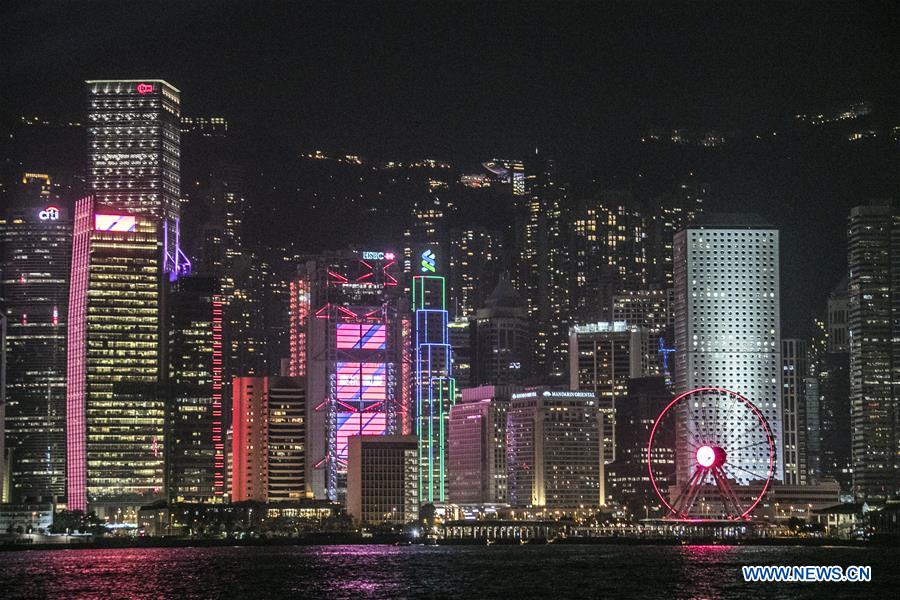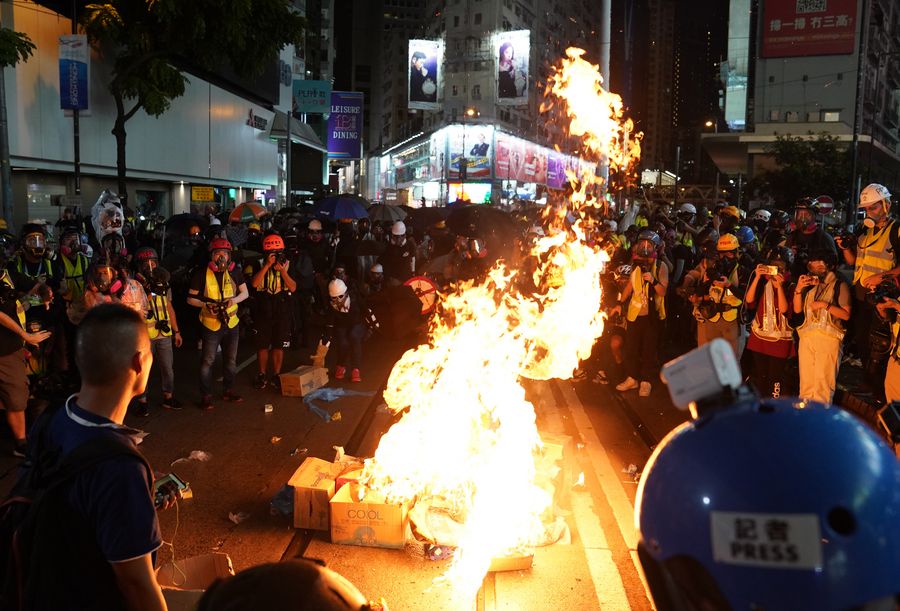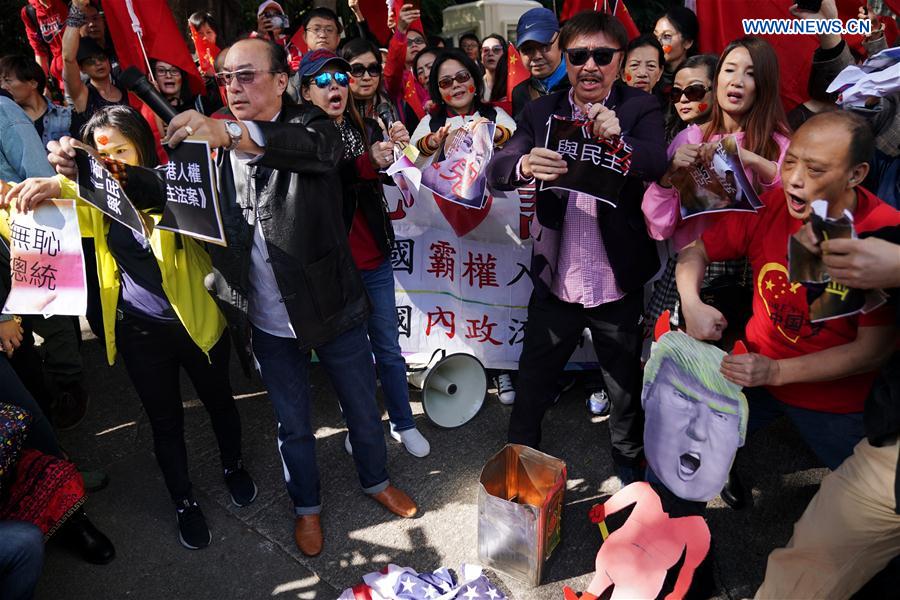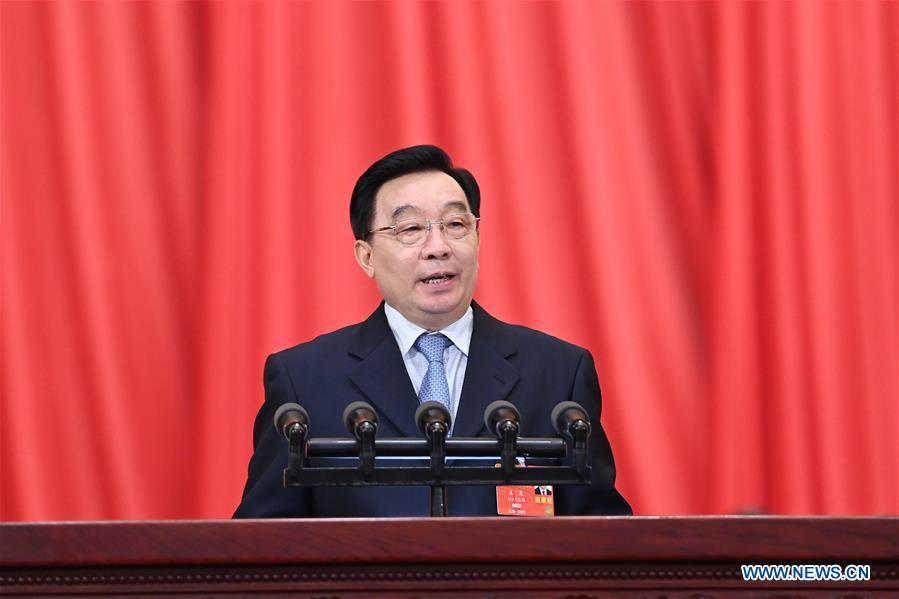A draft decision on establishing and improving the legal system and enforcement mechanisms for Hong Kong Special Administrative Region (HKSAR) to safeguard national security was submitted to the third session of the 13th National People's Congress (NPC) on Friday.
Nearly 23 years since its return to the motherland, HKSAR has not yet fulfilled its legal responsibility of enacting laws on its own to safeguard national security in accordance with Article 23 of the Basic Law.
Read more:
Draft decision on national security legislation for HK submitted to NPC
China rebuts U.S. threat on national security legislation for HKSAR
HK society voices support for national security legislation for HKSAR
The introduction of the bill at the NPC came after Hong Kong was embroiled in prolonged riots last year. Chinese Foreign Ministry Spokesperson Zhao Lijian noted in Friday's press conference that "no country in the world would allow secessionist activities, or any activities that would endanger national security."
As the Legislative Council of HKSAR has pointed out, "Hong Kong independence" forces have colluded with separatist groups in Taiwan, Tibet and Xinjiang as well as external forces against China, attempted to "occupy" and damage Hong Kong's legislature, stormed the central government's offices in Hong Kong and even called for "gaining independence through armed revolution" and "setting up an interim government" under the so-called "public square constitution."

A night view of the Central area in Hong Kong, China, September 27, 2019. /Xinhua
A night view of the Central area in Hong Kong, China, September 27, 2019. /Xinhua
What is Article 23?
Article 23 of the Basic Law of Hong Kong stipulates that the SAR shall enact laws on its own to prohibit any act of treason, secession, sedition or subversion against the Central People's Government, or theft of state secrets, to prohibit foreign political organizations or bodies from conducting political activities in the HKSAR, and to prohibit political organizations or bodies of the HKSAR from establishing ties with foreign political organizations or bodies.
Since Article 23 legislation stalled in 2003, those trying to sow trouble in Hong Kong and external hostile forces have demonized it to sabotage and obstruct its enactment.

Rioters set fires in Hong Kong, China, August 31, 2019. /Xinhua
Rioters set fires in Hong Kong, China, August 31, 2019. /Xinhua
Why is legislation necessary?
The existing national security loophole in HKSAR exacerbates multiple risks.
Wang Chen, vice chairman of the Standing Committee of the NPC, on Friday highlighted activities that have seriously challenged the bottom line of the "One Country, Two Systems" principle, harmed the rule of law and threatened national sovereignty, security and development interests.
The violence associated with the disturbances arising from the introduction of the Fugitive Offenders Bill since last June is an example. Various incidents involving even explosives and firearms have increased the risk of terrorism as well as seriously jeopardizing public safety.
Given Article 23 of the Basic Law is yet to be enacted, Hong Kong could only impose light sentences on "Hong Kong independence" forces who illegally and violently disrupted social order.

People protest against the United States' intervention in Hong Kong affairs in front of the U.S. Consulate General in Hong Kong, China, December 3, 2019. /Xinhua
People protest against the United States' intervention in Hong Kong affairs in front of the U.S. Consulate General in Hong Kong, China, December 3, 2019. /Xinhua
External forces' interference in Hong Kong affairs, for example the overt meddling by the U.S., and China's internal affairs is another factor.
In March, 2019, U.S. Vice President Mike Pence met with Hong Kong's former Chief Secretary Anson Chan. A few days later, U.S. House of Representatives Speaker Nancy Pelosi met with opposition lawmakers Dennis Kwok and Charles Mok. The opposition leaders' trip to the U.S. also included meetings with U.S. congressional committees and bar associations.
In May 2019, Pelosi and U.S. Secretary of State Mike Pompeo met with several opposition figures, including Martin Lee, Lee Cheuk-yan and Nathan Law.
In June 2019, U.S. Congressmen Marco Rubio and Jim McGovern reintroduced the so-called "Hong Kong Human Rights and Democracy Act."
In July, Pence and Pompeo held meetings with pro-opposition media tycoon Jimmy Lai, discussing Hong Kong's amendments to the Fugitive Bill.
And in the midst of the unrest, Julie Eadeh, who works at the U.S. Consulate General in Hong Kong, was filmed meeting with opposition figures Martin Lee and Anson Chan. She also met Hong Kong protest leader Joshua Wong.
In September, the U.S. Congressional-Executive Commission on China held a Hong Kong-related hearing and invited Joshua Wong and fellow protest leader Denise Ho to testify.
In October, U.S. Senator Ted Cruz met with opposition figures Anson Chan and Jimmy Lai in Hong Kong and wore black to show support for protesters.
On October 15, the U.S. House of Representatives passed the so-called "Hong Kong Human Rights and Democracy Act of 2019," which was passed by the Senate on November 19.
What's in the draft decision?
The draft decision consists of an introduction and seven articles.
Article 1 states clearly that the country will unswervingly, fully and faithfully implement the principles of "One Country, Two Systems," "the people of Hong Kong governing Hong Kong," and a high degree of autonomy; stresses taking necessary measures to establish and improve the legal system and enforcement mechanisms for the HKSAR to safeguard national security, as well as prevent, stop and punish activities endangering national security in accordance with the law.
Article 2 states clearly that the country resolutely opposes the interference in HKSAR's affairs by any foreign or external forces in any form and will take necessary countermeasures on such interferences.
Article 3 specifies that it is the HKSAR's constitutional responsibilities to safeguard national sovereignty, unity and territorial integrity; stresses that the HKSAR must complete the national security legislation stipulated in the Basic Law of the HKSAR at an earlier date and HKSAR's administrative, legislative and judicial organs must, in accordance with relevant laws and regulations, effectively prevent, stop and punish acts endangering national security.
Article 4 specifies that the HKSAR must establish and improve the institutions and enforcement mechanisms for safeguarding national security; when needed, relevant national security organs of the Central People's Government will set up agencies in the HKSAR to fulfill relevant duties to safeguard national security in accordance with the law.

Wang Chen, vice chairman of the Standing Committee of the National People's Congress (NPC), speaks at the opening meeting of the third session of the 13th NPC at the Great Hall of the People in Beijing, China, May 22, 2020. /Xinhua
Wang Chen, vice chairman of the Standing Committee of the National People's Congress (NPC), speaks at the opening meeting of the third session of the 13th NPC at the Great Hall of the People in Beijing, China, May 22, 2020. /Xinhua
Article 5 specifies that the HKSAR's chief executive must regularly report to the Central People's Government on the HKSAR's performance of the duty to safeguard national security, carry out national security education and forbid acts of endangering national security.
Article 6 specifies the constitutional meanings of related legislation of the NPC Standing Committee:
(1) Entrusting the NPC Standing Committee to formulate relevant laws on establishing and improving the legal system and enforcement mechanisms for the HKSAR to safeguard national security. The NPC Standing Committee will exercise its functions and powers of legislation under authorization;
(2) Specifying that relevant legal tasks for the NPC Standing Committee are to effectively prevent, stop and punish any act occurring in the HKSAR to split the country, subvert state power, organize and carry out terrorist activities and other behaviors that seriously endanger national security, as well as activities of foreign and external forces to interfere in the affairs of the HKSAR;
(3) Specifying the method of implementing relevant laws of the NPC Standing Committee in the HKSAR, that is, the NPC Standing Committee makes the decision to include relevant laws into Annex III of the Basic Law of the HKSAR, and the HKSAR promulgates and implements them.
Article 7 specifies that this decision shall go into effect as of the date of promulgation.
What's the process?
Deliberation of the draft decision on establishing and improving the legal system and enforcement mechanisms for the HKSAR to safeguard national security at this year's annual session of the NPC means the first step is taken.
If the draft decision is approved, the NPC Standing Committee will formulate related laws to solve Hong Kong's problems in maintaining national security, strengthen the construction of specialized and law enforcement agencies and ensure the law to be effectively implemented in Hong Kong.
After the decision is adopted, the NPC Standing Committee will work with related parties to formulate relevant laws for the HKSAR to safeguard national security, actively push for settling SAR's prominent problems in the national security system, strengthen the building of special institutions, enforcement mechanisms and law enforcement forces, for relevant laws' effective implementation in Hong Kong, Wang said on Friday.